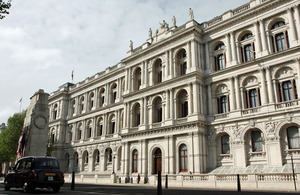20th June 2013 Athens, Greece
Building Bridges – Guest Blog
Rania Kossiori, VC Rhodes, blogs about her shadowing trip to EUMed department and the Minister of Europe’s private office.
I have been working as Vice Consul in Rhodes for the last 8 years. During this time, a lot of changes have taken place in the way that we provide assistance to British nationals overseas – which is the essence of consular work. These changes have to do both with the actual help we give to people that turn to us in times of personal distress, but also in the way we talk and organise ourselves as individuals and teams around that assistance. All this I understand to be the constant strive for diplomatic excellence: a concept that describes what I perceive to be a collective effort to be the best that we possibly can as an organisation in order to meet common objectives.
An important strand of this is building a vigorous one-team culture globally, with increased and open communication channels between London and overseas staff. Building inter-departmental bridges between various levels of staff is the reason why I travelled to London recently to shadow colleagues in the political desk and also have a little peak into the daily routine of the Minister of Europe and see what the impact and interaction of frontline consular work and high level representation is.
Indeed, I spent two days in the EUMed department, shadowing the desk officer for Greece, Spain and Portugal. My visit happily coincided with the Greek Foreign Minister’s official visit to the UK. In preparing a major political visit, the geographical desk is responsible for putting together a briefing for the Foreign Secretary, containing background information on the various issues of the agenda that had been agreed and also with liaising with a number of officers, both internally and with external partners, such as the Greek Embassy in London. An extremely useful look into how important the need for establishing a wider network of contacts is, exactly as we do in consular in building our local liaisons, which is now an integral part of our global strategy. Sitting in on an All Party Parliamentary Group meeting in Westminster, which formed part of the Greek Foreign Minister’s programme, and attending a meeting with officers from the Ministry of Defence, in order to discuss possible cooperation on putting together a more general strategy for relations with Spain, further enhanced my understanding of inter-departmental and intra-governmental workings that brought together pieces in the puzzle that constitutes the FCO as an organisation.
My shadowing visit to the Minister of Europe’s office provided a particularly useful insight into the Minister’s busy daily schedule. The 5-member team that comprises his private office work to keep the Minister’s programme informed, timely and organised. A huge undertaking, as I got to find out, as the Minister’s mission spans over a large area of responsibilities. The highlight of my visit was attending a meeting with MPs and members of the public regarding a consular case in Greece. This clearly showed to me the direct interaction that consular officers have with private office and the Minister himself and provided a unique glance on the London perspective of our work overseas.
I have to say that this 3-day visit gave me the opportunity to engage with staff in London and I feel I am now in a much better position to understand the FCO as an organisation; I have a clearer idea of how we all fit in as parts of it, how political and consular work may often overlap and how, by being more interconnected and by building more bridges between us, we can be more effective in delivering our more specific, but also, our organisations’ objectives.
